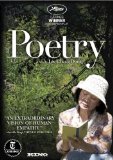| Reviews & Columns |
|
Reviews DVD TV on DVD Blu-ray 4K UHD International DVDs In Theaters Reviews by Studio Video Games Features Collector Series DVDs Easter Egg Database Interviews DVD Talk Radio Feature Articles Columns Anime Talk DVD Savant Horror DVDs The M.O.D. Squad Art House HD Talk Silent DVD
|
DVD Talk Forum |
|
|
| Resources |
|
DVD Price Search Customer Service #'s RCE Info Links |
|
Columns
|
|
|
Poetry
Kino // Unrated // August 23, 2011
List Price: $29.95 [Buy now and save at Amazon]
The Film:
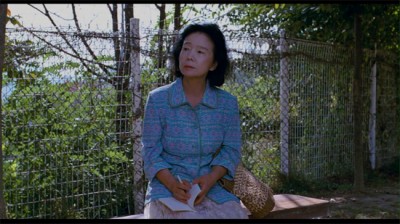 Korean directors Bong Joon-ho and Lee Chang-dong are starkly different artists, where one possesses a flair for aggressive and gritty theatrics, such as in Memories of Murder, and the other reservedly slips aching human drama into his pictures. Comparing their styles can almost be looked at with the apples-to- oranges analogy, even though both handle stirring, relevant subject matter, and it's an assessment that'd never really need stressing. Over a two year period, the two prominent directors assembled like-minded films -- Bong Joon-ho's Mother, something of a revenge whodunit, and Lee Chang-dong's Poetry -- and they couldn't be more different; both center on an intrepid, humble paternal figure doing things within their power to keep a child from feeling the law's wrath, but where Mother pivots on shocking developments and a thrilling tone, Poetry takes the practical path and becomes quietly harrowing.
Korean directors Bong Joon-ho and Lee Chang-dong are starkly different artists, where one possesses a flair for aggressive and gritty theatrics, such as in Memories of Murder, and the other reservedly slips aching human drama into his pictures. Comparing their styles can almost be looked at with the apples-to- oranges analogy, even though both handle stirring, relevant subject matter, and it's an assessment that'd never really need stressing. Over a two year period, the two prominent directors assembled like-minded films -- Bong Joon-ho's Mother, something of a revenge whodunit, and Lee Chang-dong's Poetry -- and they couldn't be more different; both center on an intrepid, humble paternal figure doing things within their power to keep a child from feeling the law's wrath, but where Mother pivots on shocking developments and a thrilling tone, Poetry takes the practical path and becomes quietly harrowing.
The most notable difference is a fundamental one resting in the main characters, where the focus in Lee Chang Dong's film is a grandmother, Mija (Yun Jeong-hie), suffering from the early effects of Alzheimer's. While she lives on government welfare, she also works as a caregiver for an elderly man who suffered from a stroke to help pay for the expenses her sloppy, bullying grandson eats up around the house. To keep her mind sharp, she elects to take a poetry class at a nearby community center, though, even after some guidance from her professor to jot down pithy notes, she struggles endlessly to find inspiration. Her quality of life isn't all that terrific, from scrubbing an old man to supporting her daughter's ungrateful kid; however, it only gets worse once she's asked to attend a dinner among the parents of her grandson's friends, where they reveal a devastating secret that demands Mija to scrounge up even more money to keep it under wraps.
While the film's title reflects on the tactic Mija uses to aid her condition, and at first it seems to center on her degradation, her memory loss isn't the story's bedrock. While assertively introspective within its cautiously-paced 130-minute runtime, Poetry isn't a meditation on her dwindling condition or loosening grip on the life she's accustomed to living; in fact, aside from a few emphasized moments early in the story's foundation-laying -- a doctor's visit, difficulty in recalling nouns, and misplacing her wallet -- it actually takes a backseat and, for the most part, doesn't intrude on the central conflict. This isn't a case where the viewer explores how an elderly woman alters her life to an approaching handicap. Instead, it works as a lingering element of immediacy, of the storm that approaches while she makes heads-or-tails of the mess that her grandson's wrapped up in, and her poetry becomes a search for beauty in her everyday chaos.
Instead of a character with attributes solely crafted to propel the story, Mija's condition shapes her into a distinct individual, with her stumbles and strife as complex vertebrae within the narrative's backbone. The flesh of Poetry's story, though, is how a near-powerless, aging, dirt-poor woman can right the wrongs set in motion by her grandson and accumulate a large sum of money, as well as how her perception of the world might beautify and strengthen in the process. Lee Chang-dong, also the film's writer, strikes a versatile balance between her cumbersome difficulties and her developing observation of the world through intermittent note-taking, allowing glimpses of Mija's inspiration to slyly slip into her trek -- such as stopping an important conversation to relish a flower's blood-red hue, savoring the flavor of an apricot, and enjoying shadows. They all have a purpose, we'll soon discover, outside of simply aesthetic diversions from her discord.
The true success in Lee Chang-dong's film lies in the nuanced performance from Yun Jeong-hie, who reentered Korean cinema after a fifteen-year hiatus specifically for this role. It's a masterfully-handled one, too; Mija endures emotional turmoil that can, at times, seem almost melodramatic in consistency, but the actress never falters in her realistic composure. Much of Poetry's emotional potency resides in her subtle facial reactions and body language, where a slight tweak in her reservedly expressive face conveys distinct pain and delight. This isn't a loudly dramatic portrayal, which makes the steady increase in her browbeaten disposition -- from a steadily-weakening walk to her slightly somewhat frazzled and sweaty demeanor -- all the more poignant. And when the weight of everything simply becomes too much for Mija to handle, it's astonishing how raw she'll leave you feeling after seeing the effects.
Lee Chang-dong didn't attempt to create any sort of thriller here, but the impetus behind the story levies a blow stronger than most in the genre. Its style moves with a pedestrian grace between the shops, bars, churches, and cootages Mija visits in search of answers and inspiration, steadily but emphatically progressing towards harder-hitting developments, and it consistently feels like we're glimpsing into the life of this destitute woman instead of merely at a character. The Korean director, once a minister for the South Korean government and a professor, emphasizes hard-edged but nimble realism in his body of work, and his perspective elevates Mija's exhausted trudge to aid her contemptible grandson, swelling the impact through an organic thrust of tension that's dictated solely by emotional authenticity. It doesn't try to be suspenseful, but the uncompromising, mounting anticipation -- a staple among his films -- effortlessly achieves this anyway.
The DVD:
Video and Audio:
With their recent coinciding Blu-ray and DVD releases, the folks at Kino have been delivering comparable presentations that, ultimately, will satisfy on either format -- The Scent of Green Papaya comes to mind. Poetry maintains this quality within its 1.85:1-framed transfer, enhanced for widescreen televisions, though it does stumble in a few areas. The disc has a few issues with rendering fine detail -- most noticeable in the noise crammed into dense grass -- as well as contours and condensed lines, which show off some jagged aliasing lines. Aside from those minor hiccups, and a noticeable lack of depth in the image, Hyun Seok Kim's elegantly ordinary cinematography sustains the modest long-shots and delicate movement quite fluidly, with tempered colors accurate to the film's aims and evenhanded contrast.
No issues could be heard in the Korean Dolby Digital 5.1 audio track, though there's not a lot of room for error within the exceedingly dialogue-driven film. Only a few ambient sound effects are incorporated in Lee Chang-dong's film -- such as footsteps echoing against linoleum flooring, the grinding of car tires against a road, a dog barking, and birds chirping outdoors -- but they're admirably captured in the scant atmospheric usage. The important thing here is the track's ability to sustain buoyancy within the verbal delivery, which, from a few loud yells to the mousy, soft whispering of Mija, eloquently pours through the front-heavy design. Only optional English subtitles accompany the sole Dolby Digital 5.1 audio track.
Special Features:
Unfortunately, there's not a lot to really discuss in terms of the supplemental content for Poetry. A brief, predictable Making Of Documentary (8:27, 4x3 Letterbox) goes over the filmmaking process that Lee Chang-dong and actress Yun Jeong-hie underwent for the picture, including some insightful behind-the-scenes shots of the director's method and the actress in interviews, as well as a short dedicated Interview with Ahn Nae-sang (2:24, 4x3 Letterbox). Trailers -- including one for Poetry (2:36, 16x9) -- and Production Stills round out the special features.
Final Thoughts:
Lee Chang-dong's Poetry might appear to be reserved, flowery material about an elderly woman coping with Alzheimer's by taking a poetry class, but those who have seen the director's previous work -- Peppermint Candy, Green Fish, and, recently, Secret Sunshine -- know better. It does incorporate some of those elements and maintains a steady, gentle pace, but the vigor behind its introspection, as well as its blistering dramatic underbelly, extends far beyond that dainty facade. Matched with Yun Jeong-hie's practically perfect performance as a weathered grandmother tirelessly reaching further than she can for her grandson, it's a poignant picture that both maintains self-aware composure and pulls no punches in its dramatic integrity. Kino's DVD looks and sounds rather good, though the peppering of special features leaves something to be desired. Still, it's a must for fans of Korean cinema. Highly Recommended.
Thomas Spurlin, Staff Reviewer -- DVDTalk Reviews | Personal Blog/Site
 Korean directors Bong Joon-ho and Lee Chang-dong are starkly different artists, where one possesses a flair for aggressive and gritty theatrics, such as in Memories of Murder, and the other reservedly slips aching human drama into his pictures. Comparing their styles can almost be looked at with the apples-to- oranges analogy, even though both handle stirring, relevant subject matter, and it's an assessment that'd never really need stressing. Over a two year period, the two prominent directors assembled like-minded films -- Bong Joon-ho's Mother, something of a revenge whodunit, and Lee Chang-dong's Poetry -- and they couldn't be more different; both center on an intrepid, humble paternal figure doing things within their power to keep a child from feeling the law's wrath, but where Mother pivots on shocking developments and a thrilling tone, Poetry takes the practical path and becomes quietly harrowing.
Korean directors Bong Joon-ho and Lee Chang-dong are starkly different artists, where one possesses a flair for aggressive and gritty theatrics, such as in Memories of Murder, and the other reservedly slips aching human drama into his pictures. Comparing their styles can almost be looked at with the apples-to- oranges analogy, even though both handle stirring, relevant subject matter, and it's an assessment that'd never really need stressing. Over a two year period, the two prominent directors assembled like-minded films -- Bong Joon-ho's Mother, something of a revenge whodunit, and Lee Chang-dong's Poetry -- and they couldn't be more different; both center on an intrepid, humble paternal figure doing things within their power to keep a child from feeling the law's wrath, but where Mother pivots on shocking developments and a thrilling tone, Poetry takes the practical path and becomes quietly harrowing. The most notable difference is a fundamental one resting in the main characters, where the focus in Lee Chang Dong's film is a grandmother, Mija (Yun Jeong-hie), suffering from the early effects of Alzheimer's. While she lives on government welfare, she also works as a caregiver for an elderly man who suffered from a stroke to help pay for the expenses her sloppy, bullying grandson eats up around the house. To keep her mind sharp, she elects to take a poetry class at a nearby community center, though, even after some guidance from her professor to jot down pithy notes, she struggles endlessly to find inspiration. Her quality of life isn't all that terrific, from scrubbing an old man to supporting her daughter's ungrateful kid; however, it only gets worse once she's asked to attend a dinner among the parents of her grandson's friends, where they reveal a devastating secret that demands Mija to scrounge up even more money to keep it under wraps.
While the film's title reflects on the tactic Mija uses to aid her condition, and at first it seems to center on her degradation, her memory loss isn't the story's bedrock. While assertively introspective within its cautiously-paced 130-minute runtime, Poetry isn't a meditation on her dwindling condition or loosening grip on the life she's accustomed to living; in fact, aside from a few emphasized moments early in the story's foundation-laying -- a doctor's visit, difficulty in recalling nouns, and misplacing her wallet -- it actually takes a backseat and, for the most part, doesn't intrude on the central conflict. This isn't a case where the viewer explores how an elderly woman alters her life to an approaching handicap. Instead, it works as a lingering element of immediacy, of the storm that approaches while she makes heads-or-tails of the mess that her grandson's wrapped up in, and her poetry becomes a search for beauty in her everyday chaos.
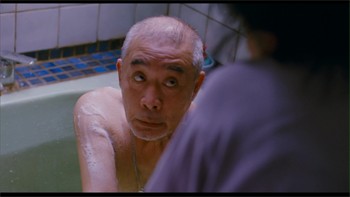 | 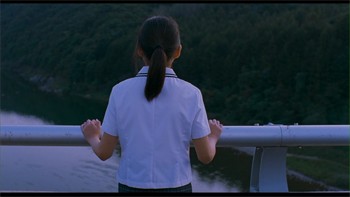 |
Instead of a character with attributes solely crafted to propel the story, Mija's condition shapes her into a distinct individual, with her stumbles and strife as complex vertebrae within the narrative's backbone. The flesh of Poetry's story, though, is how a near-powerless, aging, dirt-poor woman can right the wrongs set in motion by her grandson and accumulate a large sum of money, as well as how her perception of the world might beautify and strengthen in the process. Lee Chang-dong, also the film's writer, strikes a versatile balance between her cumbersome difficulties and her developing observation of the world through intermittent note-taking, allowing glimpses of Mija's inspiration to slyly slip into her trek -- such as stopping an important conversation to relish a flower's blood-red hue, savoring the flavor of an apricot, and enjoying shadows. They all have a purpose, we'll soon discover, outside of simply aesthetic diversions from her discord.
The true success in Lee Chang-dong's film lies in the nuanced performance from Yun Jeong-hie, who reentered Korean cinema after a fifteen-year hiatus specifically for this role. It's a masterfully-handled one, too; Mija endures emotional turmoil that can, at times, seem almost melodramatic in consistency, but the actress never falters in her realistic composure. Much of Poetry's emotional potency resides in her subtle facial reactions and body language, where a slight tweak in her reservedly expressive face conveys distinct pain and delight. This isn't a loudly dramatic portrayal, which makes the steady increase in her browbeaten disposition -- from a steadily-weakening walk to her slightly somewhat frazzled and sweaty demeanor -- all the more poignant. And when the weight of everything simply becomes too much for Mija to handle, it's astonishing how raw she'll leave you feeling after seeing the effects.
Lee Chang-dong didn't attempt to create any sort of thriller here, but the impetus behind the story levies a blow stronger than most in the genre. Its style moves with a pedestrian grace between the shops, bars, churches, and cootages Mija visits in search of answers and inspiration, steadily but emphatically progressing towards harder-hitting developments, and it consistently feels like we're glimpsing into the life of this destitute woman instead of merely at a character. The Korean director, once a minister for the South Korean government and a professor, emphasizes hard-edged but nimble realism in his body of work, and his perspective elevates Mija's exhausted trudge to aid her contemptible grandson, swelling the impact through an organic thrust of tension that's dictated solely by emotional authenticity. It doesn't try to be suspenseful, but the uncompromising, mounting anticipation -- a staple among his films -- effortlessly achieves this anyway.
The DVD:
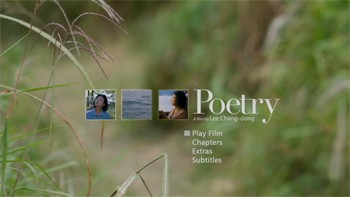 | 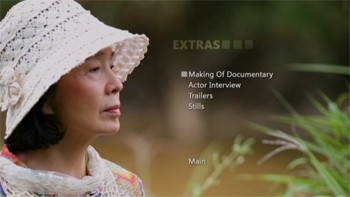 |
Video and Audio:
With their recent coinciding Blu-ray and DVD releases, the folks at Kino have been delivering comparable presentations that, ultimately, will satisfy on either format -- The Scent of Green Papaya comes to mind. Poetry maintains this quality within its 1.85:1-framed transfer, enhanced for widescreen televisions, though it does stumble in a few areas. The disc has a few issues with rendering fine detail -- most noticeable in the noise crammed into dense grass -- as well as contours and condensed lines, which show off some jagged aliasing lines. Aside from those minor hiccups, and a noticeable lack of depth in the image, Hyun Seok Kim's elegantly ordinary cinematography sustains the modest long-shots and delicate movement quite fluidly, with tempered colors accurate to the film's aims and evenhanded contrast.
No issues could be heard in the Korean Dolby Digital 5.1 audio track, though there's not a lot of room for error within the exceedingly dialogue-driven film. Only a few ambient sound effects are incorporated in Lee Chang-dong's film -- such as footsteps echoing against linoleum flooring, the grinding of car tires against a road, a dog barking, and birds chirping outdoors -- but they're admirably captured in the scant atmospheric usage. The important thing here is the track's ability to sustain buoyancy within the verbal delivery, which, from a few loud yells to the mousy, soft whispering of Mija, eloquently pours through the front-heavy design. Only optional English subtitles accompany the sole Dolby Digital 5.1 audio track.
Special Features:
Unfortunately, there's not a lot to really discuss in terms of the supplemental content for Poetry. A brief, predictable Making Of Documentary (8:27, 4x3 Letterbox) goes over the filmmaking process that Lee Chang-dong and actress Yun Jeong-hie underwent for the picture, including some insightful behind-the-scenes shots of the director's method and the actress in interviews, as well as a short dedicated Interview with Ahn Nae-sang (2:24, 4x3 Letterbox). Trailers -- including one for Poetry (2:36, 16x9) -- and Production Stills round out the special features.
Final Thoughts:
Lee Chang-dong's Poetry might appear to be reserved, flowery material about an elderly woman coping with Alzheimer's by taking a poetry class, but those who have seen the director's previous work -- Peppermint Candy, Green Fish, and, recently, Secret Sunshine -- know better. It does incorporate some of those elements and maintains a steady, gentle pace, but the vigor behind its introspection, as well as its blistering dramatic underbelly, extends far beyond that dainty facade. Matched with Yun Jeong-hie's practically perfect performance as a weathered grandmother tirelessly reaching further than she can for her grandson, it's a poignant picture that both maintains self-aware composure and pulls no punches in its dramatic integrity. Kino's DVD looks and sounds rather good, though the peppering of special features leaves something to be desired. Still, it's a must for fans of Korean cinema. Highly Recommended.
|
| Popular Reviews |
| Sponsored Links |
|
|
| Sponsored Links |
|
|
| Release List | Reviews | Shop | Newsletter | Forum | DVD Giveaways | Blu-Ray | Advertise |
|
Copyright 2024 DVDTalk.com All Rights Reserved. Legal Info, Privacy Policy, Terms of Use,
Manage Preferences,
Your Privacy Choices | |||||||









